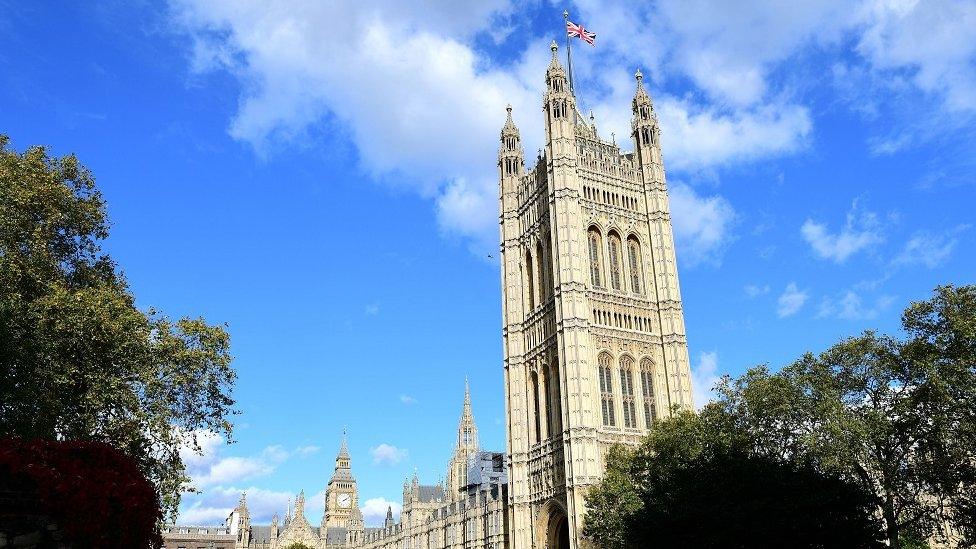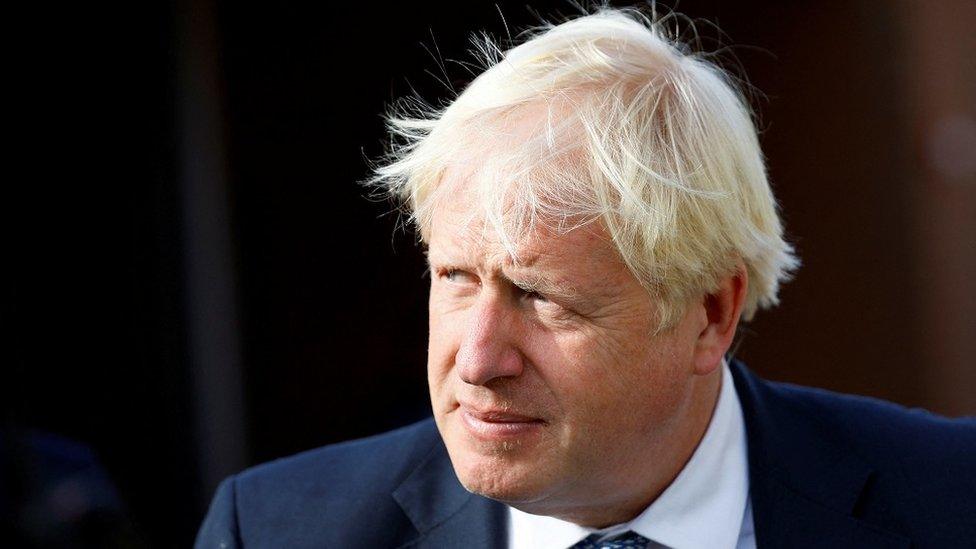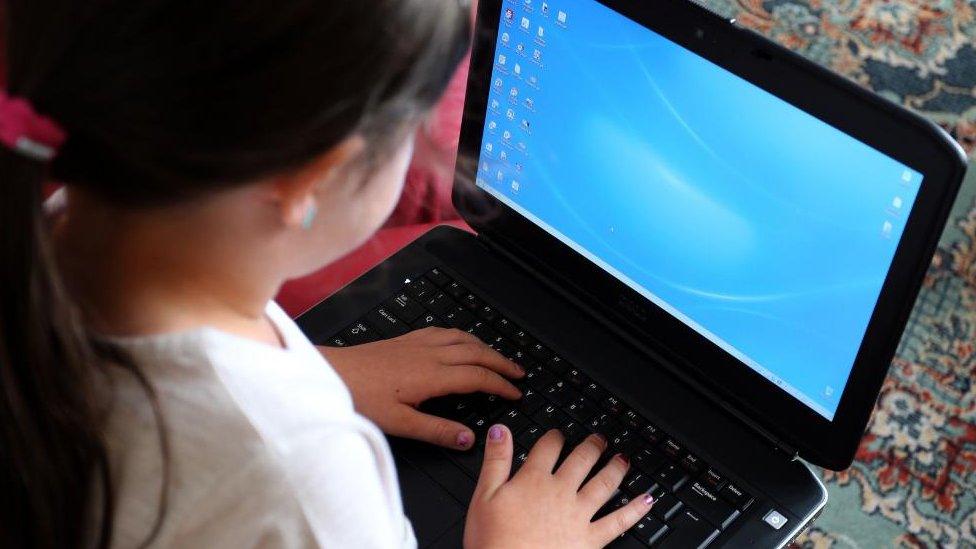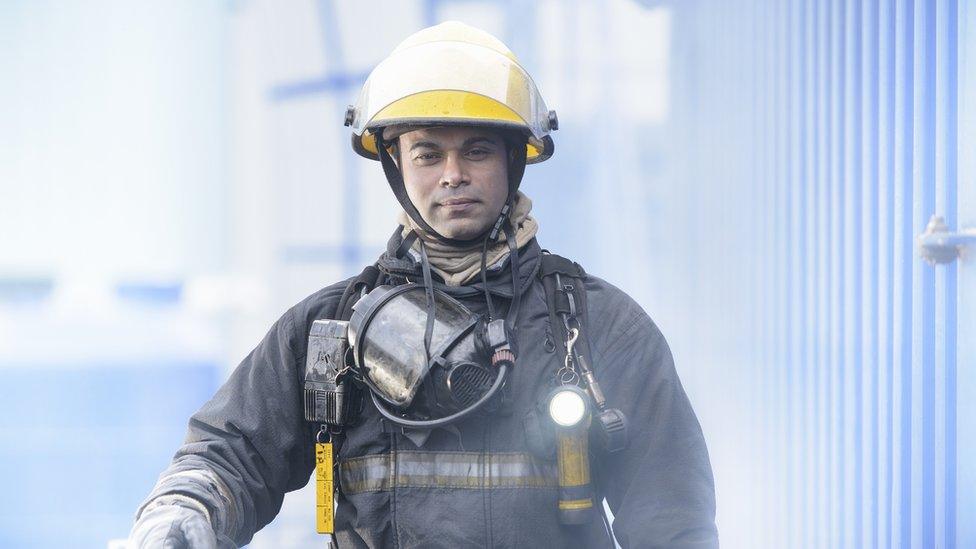What's happening in Parliament this week?
- Published

It is one of those curiously unbalanced Westminster weeks. Most of the hard law-making is happening in the Lords, while MPs mark time with a low-energy agenda in the Commons.
So while peers chew their way through the detail of the Illegal Migration Bill (where progress, incidentally, is ominously slow) and the Financial Services and Markets Bill, the Commons is whiling away the hours with a Labour Opposition Day and a series of sonorous general debates on such subjects as the work of the Council of Europe and the role of local government in achieving net zero.
The only new legislation is a rushed-through tidying-up measure on the citizenship rights of the children of EU nationals born in the UK.
The backbeat to all this is continuing "parliamentary ping-pong" on a couple of controversial bills, on retained EU law and maintaining minimum service levels during strikes. In both cases, peers may continue to dig in their heels, despite MPs rejecting the changes they have made.
Constant drama
Some behind-the-scenes dramas continue to run.
The motion to suspend former SNP MP Margaret Ferrier from the Commons for 30 days, for her breach of Covid regulations in 2020, was mysteriously pulled at the last moment on 25 May.
MPs will probably get their chance to vote (without debate) when they return from their Whitsun Recess. If successful this would likely trigger a by-election.
The Privileges Committee inquiry into whether Boris Johnson misled the House over "Partygate" has had to absorb some new information.
But it is still thought to be on course to report by the end of June - after which any sanction (potentially, at least, severe enough to trigger another by-election) would have to be confirmed by MPs.

Evidence of potential new rule breaches by Boris Johnson during the Covid pandemic have been handed to the Privileges Committee and the police
And coming up on the inside is the publication of new rules on the exclusion from the Parliamentary Estate of MPs thought to pose a risk to others.
The Commons authorities have been grappling for a while with the question of what to do about MPs accused of violent or sexual offences.
This is a high-powered constitutional, as well as safeguarding, issue. It is about stopping elected representatives from coming to parliament to speak or vote.
In a couple of recent cases accused MPs have agreed not to come in. But actually barring them from attending, if they won't agree to stay away, will require new rules to be voted through by Parliament.
And that leads to tricky questions about the threshold for invoking them, and about who should make such decisions. Should it be the Speaker, or some other authority?
The House of Commons Commission is due to publish draft rules on 5 June, with a view to a full-dress Commons debate the following week. So expect some preliminary skirmishing to break out as soon as MPs get hold of whatever is proposed.
Monday 5 June
Commons: At 14.30 BST, it's Levelling Up Questions, with any post-recess urgent questions or government statements following.
Main Debate: Two backbench debates. First, on the role of local government in reaching net zero, through their role in key sectors like buildings, transport, waste, and energy infrastructure. Lib Dem Wera Hobhouse leads.
Second, on delivering new housing supply. Housing affordability has gone from three times income to more than nine times income. Conservative David Davis leads.
Westminster Hall: (16:30) MPs debate e-petition 622847, calling for the government to bring in a statutory duty of care for higher education institutions, to their students. A preliminary hearing by the Petitions Committee heard from the parents of children lost to suicide, who believed that more could have been done to protect them.
Committees: The Public Accounts Committee meets at 16:00 to question the civil service officials responsible for major, expensive government programmes that have required a "reset" - like Crossrail and the rollout of Universal Credit.
Lords: (14:30) It's day two of peers; detailed Committee debate on the Illegal Migration Bill.
Tuesday 6 June
Commons: Starts at 11:30 with Health Questions. Then a Ten Minute Rule Bill from Labour's Dan Carden. He wants users of health and care services to have the right to be accompanied by a care supporter.
Main Debate: All stages of the British Nationality Bill. This is a tidying-up measure clarifying the citizenship rights of the children of EU nationals born in the UK, following recent legal rulings.
Westminster Hall: Lib Dem Wendy Chamberlain leads a debate on support for Afghan women and girls (09:30). The debate notes that 20 years of progress has been wiped out since the Taliban victory.
Committees: The Health and Social Care Committee (09:30) continues its inquiry into assisted dying/assisted suicide with evidence session from experts in Belgium, the Netherlands and Canada.
The International Development Committee (14:30) has what promises to be an interesting session with Development Minister Andrew Mitchell, who was International Development Secretary back when DfID was a separate department in its own right.
The Home Affairs Committee (09:30) examines the Terrorism (Protection of Premises) Draft Bill, external, AKA Martyn's Law, which would require venues to consider risks to the public from terrorism. Witnesses include Figen Murray, the mother of Martyn Hett who was killed in the Manchester Arena bombing.
Lords: (14:30) Peers consider Commons amendments to the Retained EU Law Bill, and look at the detail of the Financial Services and Markets Bill.
Wednesday 7 June
Commons: (11:30) Women and Equalities Questions, followed at midday by Prime Minister's Question Time.
Then a Ten Minute Rule Bill. Conservative Mark Pawsey wants to require cyclists to wear helmets when using the public highway.
Main Debate: A Labour Opposition Day debate, on a motion or motions to be announced.
Westminster Hall: Labour's Florence Eshalomi leads a debate on school closures and pupil numbers in London.
Committees: The Environmental Audit Committee (14:15) looks at whether the UK's food system is resilient enough to cope with a warming climate. Witnesses include environmentalist George Monbiot, and the Country Land and Business Association.
The Treasury Committee (14:15) questions insurance industry bosses on the impact of inflation on insurance premiums, the conduct of insurers when handling claims, and the size of insurance premiums.
Lords: (15:00) Peers continue their detailed debate on the Illegal Migration Bill (day 3 of 5). This is the "probing" stage of debate, where it is very rare for issues to be forced to a vote. Expect much more intense activity at the following Report Stage.
Thursday 8 June
Commons: (09:30) Transport Questions, followed by the weekly update on the forthcoming Commons agenda, from the Leader of the House.
Main debate: Two more on subjects chosen by the Backbench Business Committee. First, Conservative Dame Caroline Dineage leads on Carers Week - the annual carers awareness campaign in the UK. The focus will be on the contribution of millions of unpaid carers and the support they need.
Then Conservative John Howell leads on the work of the Council of Europe - on which he is the lead UK member. This is the 46-member state umbrella group for parliamentarians in Europe.
Westminster Hall: Labour's Wayne David leads a debate on preventing obesity and fatty liver disease (13:30).
Committees: Public Accounts (09:30) looks at prisoner rehabilitation.
Lords: (11:00) Peers respond to Commons amendments to the Strikes (Minimum Service Levels) Bill.
Then it's back to Report consideration of the Financial Services and Markets Bill (day 2 of 3).
Friday 9 June
Neither House is due to sit.
Related topics
- Published13 January 2023

- Published31 January 2023

